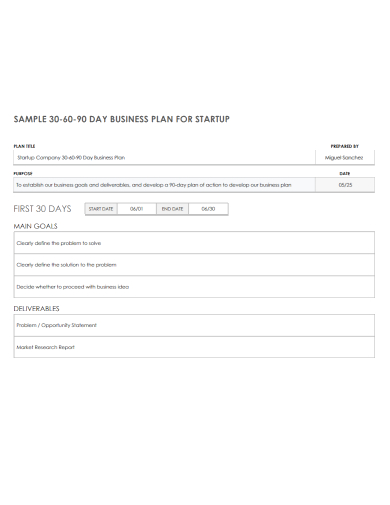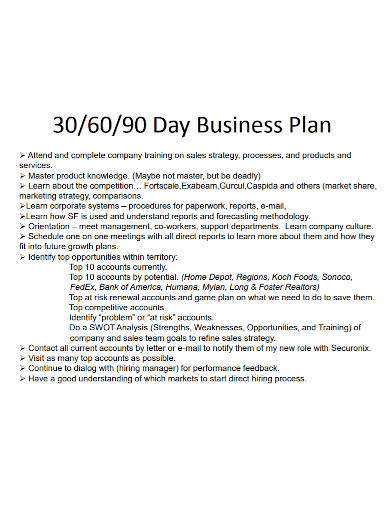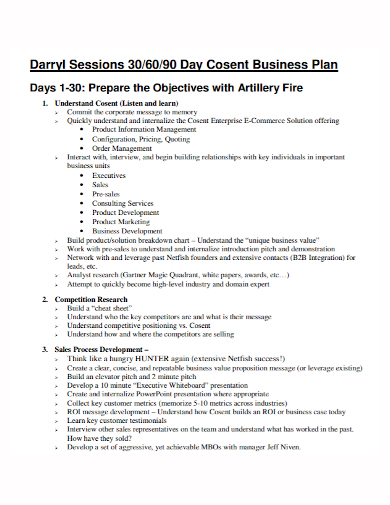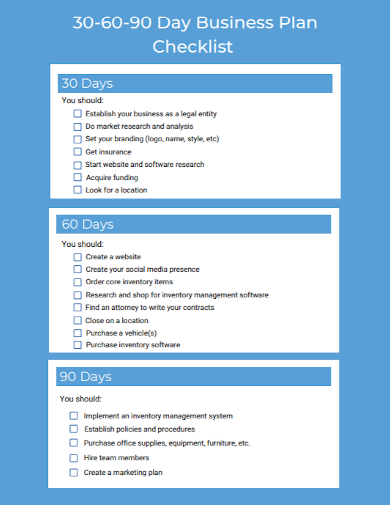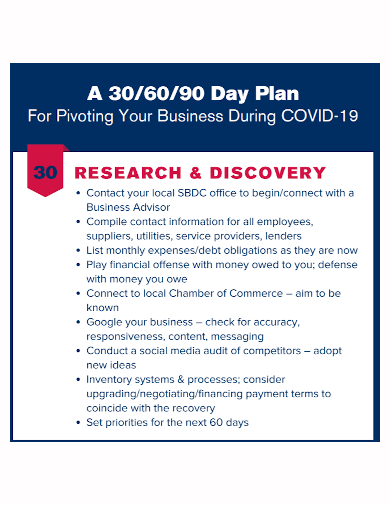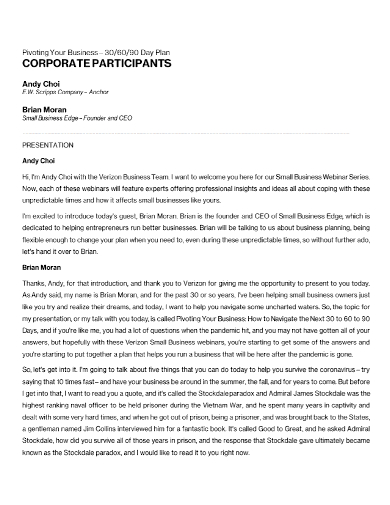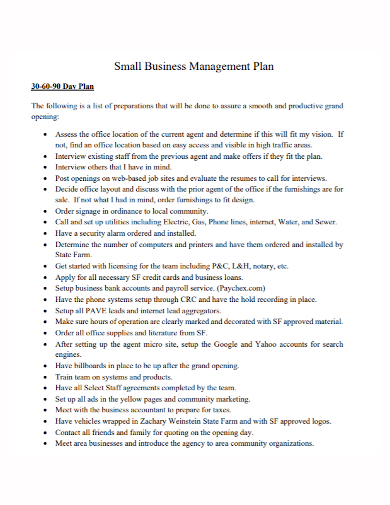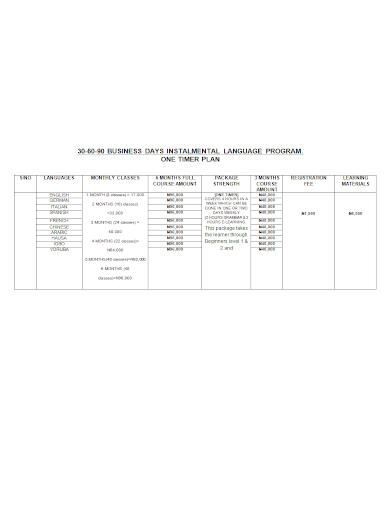Have you made a plan for your business? Proper business planning offers you the peace of mind of knowing that you’ve devised a strategic plan and that your objectives are within reach. Having a good business plan is important for your continued success. A business plan is used to assist in the management of an organization by defining goals, how they will be reached, and when they will be achieved. The strategy will also serve as a summary of the company’s mission, why it exists, and where it intends to go. If you want to create an actionable business plan with timely goals, look no further! In this article, we provide you with free and ready-to-use samples of 30-60-90-Day Business Plans for your retail and sales strategy. Keep on reading to find out more!
10+ 30-60-90-Day Business Plan Samples
1. 30-60-90-Day Business Plan Template

2. 30-60-90-Day Pharmaceutical Business Plan Template

3. 30-60-90 Day Strategic Business Plan Template

4. 30-60-90-Day Startup Business Plan
5. Sample 30-60-90-Day Business Plan
6. 30-60-90-Day Cosent Business Plan
7. Standard 30-60-90-Day Business Plan
8. 30-60-90-Day Research Business Plan
9. 30-60-90-Day Corporate Business Plan
10. 30-60-90-Day Business Management Plan
11. 30-60-90-Day Business Program Plan
What Is a 30-60-90-Day Business Plan?
A 30-day, 60-day, and 90-day plan is a document that outlines your goals for the first 30, 60, and 90 days on the job. It outlines your top objectives and actionable goals, as well as the measurements you’ll use to assess your progress over the next three months. It should include information regarding onboarding and training, as well as established goals that you should achieve at the conclusion of each phase, as well as all the people to meet and resources to review in order to achieve those goals.
A 30-60-90 day plan may be beneficial to any industry or work function, although it is most often used by salespeople and managers. Because these positions tend to operate autonomously, taking the effort to align goals with the company’s vision ensures that all new workers contribute to the company’s success.
How to Make a 30-60-90-Day Plan
Before you get into the nitty gritty of your 30-60-90 strategy, consider about the high-level components you’ll need to include. What criteria should you use to determine your focus, priorities, goals, and metrics? A 30-60-90-Day Plan Template can provide you with a framework rather than starting one from scratch. You can choose one of our excellent templates listed above to ensure that you have a robust and well-structured plan. Other than that. should you write one on your own, check out these tips below to guide you:
1. Examine the big picture.
Before you start writing down specific goals and measures, think about your overall priorities. Determine why they hired you and set goals that will help you achieve that goal. Make a list of your new job’s objectives. These should be SMART goals, such as learning, performance, or personal objectives. Make a broad list of objectives, then group them into the proper categories on your template.
2. Determine your 30-day, 60-day, and 90-day targets.
Examine your learning, personal, and performance objectives. Identify any learning or knowledge-based objectives. The first 30 days on the job should be spent learning all there is to know about the firm and your individual function. Determine contribution-related objectives. These objectives should be based on putting what you learned in the first 30 days into practice. The second 30 days of employment should be devoted to helping the firm achieve its goals. Determine your leadership objectives. The last 30 days should be spent putting the information and experience obtained in the first 60 days to use in leading a team in an acceptable and successful manner.
3. Make a plan for how you’ll measure your success.
For each of your objectives, this will most likely be different. Although most metrics are quantitative (money, page visits, etc. ), certain goals may contain qualitative measures, such as good customer feedback. Even qualitative indicators, such as the amount of five-star reviews you receive, should be quantifiable.
4. Make sure your priorities are adaptable.
Lastly, remember that you don’t have to strictly adhere to your original monthly plan. Because every job is different, make your strategy based on what you know about the role and the company, but keep in mind that it will almost certainly change. Throughout the first 90 days, ask for comments. A SWOT Analysis may be used to alter the rest of your strategy as well as create long-term objectives and strategies.
FAQs
What should be included in a 90-day business plan?
While there is no defined length for a 30-day, 60-day, or 90-day plan, it should include information regarding onboarding and training, established goals for each phase, and all the individuals to meet and materials to review in support of those goals.
Why are the first 90 days so crucial?
In the end, the first 90 days are a test. You’re not the only one assessing your new hire; they’re also reviewing you. By giving your new recruit a fantastic first day, you’re creating a favorable precedent that might lead to them staying with your firm longer. That’s why it’s critical to establish excellent habits right away.
How many monthly goals should you establish for yourself?
Create about 50 mini objectives, about 4 mini goals each month—one for each week, using your list of techniques as a reference. Each mini objective should be completed in no more than a week.
A business plan’s goal is to assist you in formulating a strategy for launching your company. It also includes information on the activities to follow, the resources needed to achieve your company objectives, and a timetable for expected outcomes. To help achieve your business plan’s objectives, download our customizable and comprehensive 30-60-90-Day Business Plan samples today!
Related Posts
FREE 8+ Debt Management Plan Samples in PDF | DOC
FREE 4+ 30-60-90-Day Marketing Plan Samples in MS Word | Google Docs | Apple Pages | PDF
FREE 10+ Higher Education Lesson Plan Samples in MS Word | Pages | Google Docs | PDF
FREE 9+ 30-Day Marketing Plan Samples in PDF | MS Word | Apple Pages | Google Docs
Marketing Plan For Small Business Samples
FREE 7+ Fashion Business Plan Samples in PDF
FREE 10+ Sprint Planning Samples In MS Word | Google Docs | PDF
FREE 10+ Wedding Planning Samples in MS Word | Apple Pages | Powerpoint | PDF
FREE 9+ Monthly Study Planner Samples in PSD | Illustrator | InDesign | PDF
FREE 9+ Sample Curriculum Planning Templates in PDF | MS Word
FREE 10+ Teacher Development Plan Samples in MS Word | Google Docs | Apple Pages | PDF
FREE 10+ Basketball Practice Plan Samples in PDF
FREE 12+ School Business Plan Samples in PDF | MS Word | Apple Pages | Google Docs
FREE 7+ Client Strategic Plan Samples in PDF | MS Word
FREE 11+ Trucking Business Plan Templates in PDF | MS Word | Google Docs | Pages

